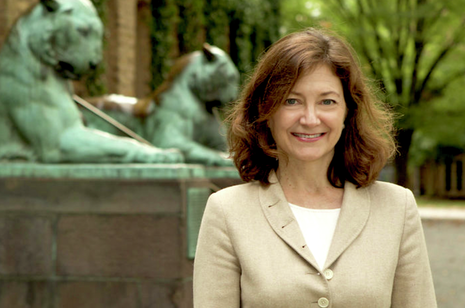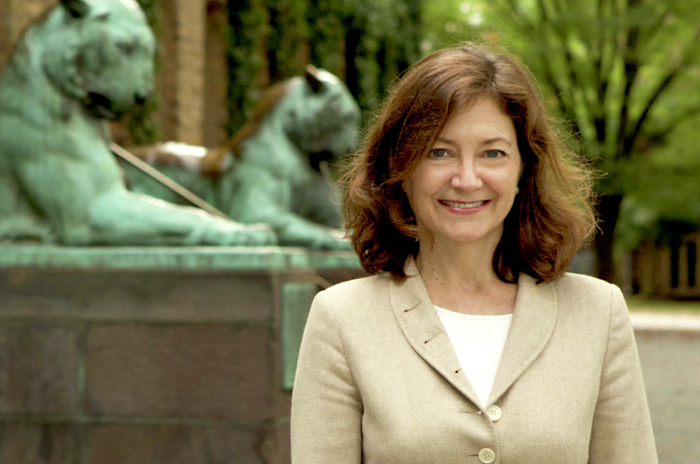New vice-chancellor admits graduating cohort have had ‘worst ever student experience’
Cambridge’s new vice-chancellor also outlined her plans for free speech ‘dialogues’

Cambridge’s new vice-chancellor, Deborah Prentice, admits the current cohort of graduates have been “dealt a terrible hand by fate”. She also has outlined her plans for promoting free speech in the University, her concerns on research collaboration with China and her aims to promote access in the University.
Of the students affected by the marking and assessment boycott after also being drastically impacted by the pandemic, Prentice told The Times: “I admire their resilience enormously. I was very struck – they’re an impressively sober and feet-on-the-ground generation […] I know there is a lot of uncertainty, anxiety and anger on their part and from their parents.”
The interview follows Prentice’s inaugural speech as vice-chancellor last week (05/07), when she said that “being in Cambridge, living and learning here for the past few months, has deepened my understanding of the significance of this institution, for scholarship and discovery certainly, and also for the world beyond the academy.”
Prentice highlighted the significance of King Charles’ visit to the Whittle Laboratory in his first post-coronation duty as a “powerful indication” of the significant role that Cambridge plays in the “economic development of their regions and the nation”. Prentice made a commitment to “hold the baton”, thanking her predecessor Anthony Freeling, and promised to “continue to fortify the University’s foundations”.
Prentice also discussed her policy on free speech. She believes that self-censorship leads to “spirals of silence”, which she finds “even more worrying than speaker cancellations” or other forms of no-platforming. Mirroring the message touted by the Government’s own “free speech tsar”, Gonville & Caius fellow Arif Ahmed, Prentice said that “people are reluctant to express views if they don’t know how they’re going to be received […] There are people holding back their views because the forum out there for expressing them is too scary or not receptive.”
To address this, Prentice hopes to hold events to “debate critical issues” by introducing “dialogues” where students discuss controversial issues in a less confrontational way than formal debates, such as those that take place in the Cambridge Union, which “polarise participants into camps and lead to winners and losers”.
Prentice also admitted that “there are parts of the country where we still don’t do as well as we would like to, we don’t get enough people from the North of England. There are plenty of talented people in the North.”
While Cambridge has “done a fantastic job of broadening access, with 72.5 per cent state school intake, up from 61 per cent ten years ago,” she says “whether those are the right categories for recording, I honestly don’t know.” She reassured private school applicants who may “fear discrimination” that “we are open to talent from absolutely everywhere and it’s more competitive because we’re trying to get the applicant numbers up but there’s no discrimination.”
Prentice has also taken a strong stance on China. “We have to be obviously concerned about the risks of collaborating with a country that doesn’t necessarily share our values.”
“The push is now really to make researchers aware” of safeguards to vet partnerships with China.
Prentice plans to work with Oxford’s recently appointed vice-chancellor, Irene Tracey, to “advocate together for ideas that matter and for higher education in the UK generally.” As the first female duo leading both Oxbridge institutions, Prentice believes “the potential for collaboration is huge and as yet untapped” – though she is keen to note that this won’t stop her from “screaming for Cambridge to win” in the Boat Race.
 News / Right-wing billionaire Peter Thiel gives ‘antichrist’ lecture in Cambridge6 February 2026
News / Right-wing billionaire Peter Thiel gives ‘antichrist’ lecture in Cambridge6 February 2026 News / John’s duped into £10m overspend6 February 2026
News / John’s duped into £10m overspend6 February 2026 News / Epstein contacted Cambridge academics about research funding6 February 2026
News / Epstein contacted Cambridge academics about research funding6 February 2026 News / Lucy Cav students go on rent strike over hot water issues6 February 2026
News / Lucy Cav students go on rent strike over hot water issues6 February 2026 News / Corpus FemSoc no longer named after man6 February 2026
News / Corpus FemSoc no longer named after man6 February 2026










